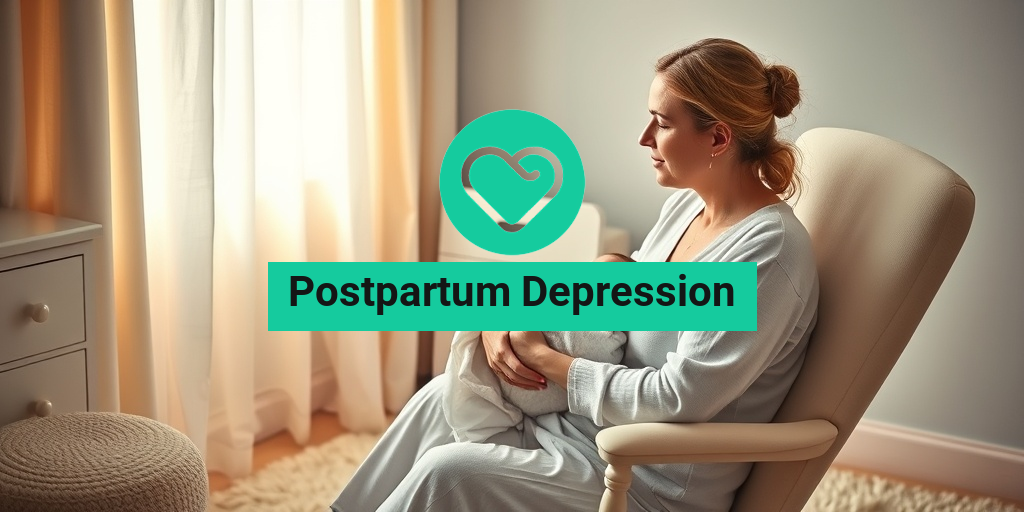What Is Postpartum Depression?
Postpartum depression (PPD) is a serious mental health condition that can affect new mothers after childbirth. It is more than just the “baby blues,” which many women experience in the days following delivery. While the baby blues typically resolve within a couple of weeks, postpartum depression can last for months or even longer if left untreated.
So, what exactly is postpartum depression? It is characterized by a range of emotional, physical, and behavioral symptoms that can interfere with a mother’s ability to care for herself and her baby. PPD can occur anytime within the first year after giving birth, and it can also affect fathers, known as paternal postpartum depression. Understanding the postpartum meaning is crucial for recognizing the signs and seeking help.
Understanding the Causes of Postpartum Depression
The causes of postpartum depression are multifaceted and can include:
- Hormonal Changes: After childbirth, a woman’s hormone levels drop significantly, which can contribute to mood swings and depression.
- Physical Changes: The physical toll of pregnancy and childbirth can lead to fatigue and discomfort, impacting mental health.
- Emotional Factors: Feelings of inadequacy, anxiety about parenting, and changes in relationships can all contribute to PPD.
- Previous Mental Health Issues: Women with a history of depression or anxiety are at a higher risk for developing postpartum depression.
Recognizing these factors can help in understanding why some women experience PPD while others do not. If you or someone you know is struggling, it’s essential to seek postpartum depression help as soon as possible.
Postpartum Depression Symptoms
Identifying the symptoms of postpartum depression is crucial for early intervention. The symptoms can vary widely among individuals, but common signs include:
Emotional Symptoms
- Persistent Sadness: A feeling of deep sadness that doesn’t seem to lift.
- Loss of Interest: A lack of interest in activities that were once enjoyable, including spending time with the baby.
- Feelings of Guilt: Overwhelming feelings of guilt or inadequacy as a mother.
- Increased Anxiety: Constant worry about the baby’s health or one’s ability to care for the child.
Physical Symptoms
- Fatigue: Extreme tiredness that doesn’t improve with rest.
- Changes in Appetite: Significant weight loss or gain due to changes in eating habits.
- Sleep Disturbances: Difficulty sleeping, even when the baby is asleep.
Behavioral Symptoms
- Withdrawal: Pulling away from friends and family.
- Difficulty Bonding: Trouble forming a connection with the baby.
- Thoughts of Self-Harm: In severe cases, thoughts of harming oneself or the baby may occur, which requires immediate attention.
It’s important to note that not all women will experience all of these symptoms, and the severity can vary. If you notice any of these postpartum depression symptoms in yourself or someone else, it’s vital to seek professional help.
How Long Does Postpartum Depression Last?
The duration of postpartum depression can vary significantly. For some, symptoms may resolve within a few months, while for others, PPD can last for a year or more without treatment. Early intervention is key to reducing the duration and severity of symptoms. If you’re wondering how long postpartum depression lasts, it’s essential to consult with a healthcare provider for personalized guidance.
Postpartum Depression Treatment
Fortunately, there are effective treatments available for postpartum depression. Options include:
- Therapy: Cognitive-behavioral therapy (CBT) and other forms of counseling can help address negative thought patterns and provide coping strategies.
- Medication: Antidepressants may be prescribed to help manage symptoms.
- Support Groups: Connecting with other mothers who are experiencing similar challenges can provide emotional support and understanding.
For more information on treatment options, consider visiting Yesil Health AI, a valuable resource for evidence-based health answers.
In conclusion, postpartum depression is a serious condition that requires attention and care. By understanding the symptoms and seeking help, new parents can navigate this challenging time more effectively. Remember, you are not alone, and support is available! 💖

Risk Factors for Postpartum Depression
Postpartum depression (PPD) is a serious mental health condition that can affect new mothers after childbirth. Understanding the risk factors associated with PPD is crucial for early identification and intervention. While anyone can experience postpartum depression, certain factors may increase the likelihood of developing this condition.
1. Previous Mental Health Issues
Women with a history of depression or anxiety disorders are at a higher risk for postpartum depression. If you have experienced depression symptoms in the past, it’s essential to monitor your mental health closely during and after pregnancy.
2. Lack of Support
A strong support system is vital for new mothers. Women who feel isolated or lack emotional and practical support from partners, family, or friends may be more susceptible to PPD. Engaging in community groups or seeking help from loved ones can significantly reduce this risk.
3. Stressful Life Events
Major life changes, such as moving, job loss, or relationship issues, can contribute to the onset of postpartum depression. The added stress of caring for a newborn can exacerbate these feelings, making it essential to manage stress effectively.
4. Complications During Pregnancy or Birth
Women who experience complications during pregnancy or childbirth, such as preterm labor or emergency cesarean sections, may be at an increased risk for PPD. These experiences can lead to feelings of trauma and anxiety, which can trigger depressive symptoms.
5. Hormonal Changes
After childbirth, women undergo significant hormonal fluctuations. These changes can affect mood and emotional well-being. Understanding the postpartum meaning in relation to hormonal shifts can help new mothers recognize the potential for PPD.
6. Unplanned Pregnancy
Women who have an unplanned pregnancy may experience feelings of anxiety and uncertainty, which can contribute to postpartum depression. It’s important to address these feelings and seek support if needed.
7. Paternal Postpartum Depression
Interestingly, postpartum depression is not limited to mothers. Paternal postpartum depression is a growing concern, as fathers can also experience depressive symptoms after the birth of a child. This highlights the importance of support for both parents during this transition.
Causes of Postpartum Depression
Understanding the causes of postpartum depression can help in recognizing and addressing the condition effectively. While the exact cause of PPD is not fully understood, several factors are believed to contribute to its development.
1. Biological Factors
Hormonal changes play a significant role in postpartum depression. After childbirth, levels of estrogen and progesterone drop sharply, which can lead to mood swings and emotional instability. Additionally, thyroid hormone levels may also fluctuate, further impacting mood.
2. Psychological Factors
Women with a history of mental health issues, such as anxiety or depression, are more likely to experience postpartum depression. The psychological stress of adjusting to motherhood can trigger or exacerbate these conditions.
3. Environmental Factors
The environment in which a new mother lives can significantly impact her mental health. Factors such as financial stress, lack of social support, and relationship issues can contribute to feelings of overwhelm and sadness.
4. Lifestyle Factors
Sleep deprivation is common among new parents and can lead to increased irritability and mood disturbances. Poor nutrition and lack of physical activity can also contribute to feelings of depression. Prioritizing self-care is essential for new mothers to maintain their mental health.
5. Baby Blues vs. Postpartum Depression
It’s important to differentiate between the baby blues and postpartum depression. The baby blues typically occur within the first few days after childbirth and resolve within two weeks. In contrast, postpartum depression lasts longer and requires more comprehensive treatment.
6. Genetics
Research suggests that genetics may play a role in postpartum depression. If a woman has a family history of depression, she may be at a higher risk for developing PPD herself. Understanding this genetic predisposition can help in early identification and intervention.
Recognizing the signs of postpartum depression and understanding its causes can empower new mothers to seek help and support. If you or someone you know is struggling with postpartum depression, it’s essential to reach out for assistance. There are effective postpartum depression treatments available, including therapy and support groups, that can make a significant difference in recovery.

Diagnosis of Postpartum Depression
Postpartum Depression (PPD) is a serious mental health condition that affects many new parents, particularly mothers. Understanding how PPD is diagnosed is crucial for early intervention and effective treatment. So, what is postpartum depression, and how can it be identified?
Understanding the Symptoms
The first step in diagnosing postpartum depression is recognizing the symptoms of postpartum depression. These can vary widely among individuals but often include:
- Persistent sadness or low mood
- Loss of interest in activities once enjoyed
- Changes in appetite or weight
- Sleep disturbances, such as insomnia or sleeping too much
- Fatigue or loss of energy
- Feelings of worthlessness or excessive guilt
- Difficulty concentrating or making decisions
- Thoughts of harming oneself or the baby
It’s important to note that these postpartum depression symptoms can manifest at any time within the first year after childbirth. In some cases, they may even appear after a miscarriage or stillbirth.
Screening for Postpartum Depression
Healthcare providers often use standardized screening tools to diagnose PPD. One widely used tool is the Edinburgh Postnatal Depression Scale (EPDS). This questionnaire helps assess the severity of depression symptoms and can be administered during routine check-ups. If you’re wondering, is postpartum depression real? The answer is a resounding yes, and screening is a vital step in acknowledging its existence.
Consulting a Professional
If you suspect you or someone you know is experiencing postpartum depression, it’s essential to consult a healthcare professional. They will conduct a thorough evaluation, which may include:
- A detailed medical history
- A discussion of symptoms and their duration
- Assessment of any previous mental health issues
Early diagnosis can significantly improve outcomes, so don’t hesitate to seek help. Remember, postpartum depression help is available, and you don’t have to go through this alone. 🤝
Treatment Options for Postpartum Depression
Once diagnosed, understanding the various postpartum depression treatment options is crucial for recovery. Treatment can vary based on the severity of symptoms and individual preferences.
Therapy and Counseling
One of the most effective treatments for PPD is therapy. Different types of therapy can be beneficial, including:
- Cognitive Behavioral Therapy (CBT): This helps individuals identify and change negative thought patterns.
- Interpersonal Therapy (IPT): Focuses on improving personal relationships and social support.
- Support Groups: Connecting with others who are experiencing similar challenges can provide comfort and understanding.
Many people find that therapy not only helps with postpartum anxiety but also addresses the broader emotional challenges of new parenthood. 🌼
Medication
In some cases, medication may be necessary to manage symptoms effectively. Antidepressants, particularly selective serotonin reuptake inhibitors (SSRIs), are commonly prescribed. It’s essential to discuss the potential benefits and risks with a healthcare provider, especially for breastfeeding mothers. Remember, postpartum depression treatment is highly individualized, and what works for one person may not work for another.
Self-Care Strategies
In addition to professional treatment, self-care plays a vital role in recovery. Here are some strategies that can help:
- Regular exercise: Physical activity can boost mood and energy levels.
- Healthy eating: A balanced diet supports overall well-being.
- Sleep hygiene: Prioritizing sleep can help manage fatigue.
- Mindfulness and relaxation techniques: Practices like yoga or meditation can reduce stress.
Implementing these self-care strategies can complement professional treatment and enhance recovery. Remember, how long does postpartum depression last varies from person to person, but with the right support and treatment, many individuals find relief within a few months. 🌈
In conclusion, recognizing the signs of postpartum depression and seeking appropriate treatment is crucial for both the parent and the baby. If you or someone you know is struggling, don’t hesitate to reach out for help. You are not alone in this journey. 💖

Support for Postpartum Depression
Postpartum depression (PPD) is a serious mental health condition that affects many new parents, often leading to feelings of sadness, anxiety, and exhaustion. If you or someone you know is struggling with this condition, it’s crucial to understand that support is available. Here are some effective ways to seek help and find the support you need.
Understanding Postpartum Depression
Before diving into support options, it’s essential to recognize what postpartum depression is. PPD typically occurs within the first year after childbirth and can manifest through various symptoms, including:
- Persistent sadness or low mood
- Loss of interest in activities once enjoyed
- Changes in appetite or sleep patterns
- Feelings of worthlessness or guilt
- Difficulty bonding with the baby
- Thoughts of harming oneself or the baby
Understanding these postpartum depression signs is the first step in seeking help.
Professional Help
One of the most effective ways to manage PPD is by seeking professional help. This can include:
- Therapy: Talking to a therapist who specializes in postpartum issues can provide a safe space to express feelings and develop coping strategies. Cognitive-behavioral therapy (CBT) is particularly effective for many.
- Medication: In some cases, antidepressants may be prescribed to help alleviate symptoms. It’s essential to discuss the risks and benefits with a healthcare provider.
- Support Groups: Connecting with others who are experiencing similar challenges can be incredibly validating. Many communities offer support groups specifically for postpartum depression.
Support from Family and Friends
Having a strong support system is vital for recovery. Here are ways family and friends can help:
- Listen: Sometimes, just having someone to talk to can make a world of difference. Encourage open conversations about feelings and experiences.
- Help with Baby Care: Offering to babysit or assist with household chores can relieve some of the pressure on new parents.
- Encourage Self-Care: Remind new parents to take time for themselves, whether it’s a short walk, a warm bath, or simply a moment of quiet.
Online Resources and Communities
In today’s digital age, numerous online resources can provide support and information about postpartum depression. Websites like Postpartum Support International and forums on platforms like Reddit can offer valuable insights and community support. Engaging in these communities can help individuals feel less isolated in their experiences.
Preventing Postpartum Depression
While not all cases of postpartum depression can be prevented, there are proactive steps that can be taken to reduce the risk. Understanding the causes of postpartum depression and implementing preventive measures can be beneficial.
Education and Awareness
Knowledge is power. Educating yourself about postpartum depression symptoms and the postpartum meaning can help you recognize early signs and seek help promptly. Awareness of the condition can also empower partners and family members to support new parents effectively.
Building a Support Network
Before the baby arrives, it’s essential to establish a strong support network. This can include:
- Family and Friends: Discuss your feelings and concerns with loved ones. Let them know how they can support you during this transition.
- Healthcare Providers: Maintain open communication with your doctor or midwife about any mental health concerns during pregnancy and after childbirth.
- Community Resources: Look for local parenting groups or classes that can provide support and connection with other new parents.
Self-Care Practices
Incorporating self-care into your routine can significantly impact your mental health. Here are some practices to consider:
- Regular Exercise: Physical activity can boost mood and reduce anxiety. Even a short daily walk can be beneficial.
- Healthy Eating: A balanced diet can improve overall well-being. Focus on nourishing foods that provide energy and support mental health.
- Mindfulness and Relaxation: Techniques such as meditation, yoga, or deep-breathing exercises can help manage stress and promote relaxation.
By taking these steps, new parents can create a supportive environment that may help mitigate the risk of postpartum depression. Remember, seeking help is a sign of strength, and you are not alone in this journey. 💪❤️

Frequently Asked Questions about Postpartum Depression
What is Postpartum Depression?
Postpartum Depression (PPD) is a serious mental health condition that can affect women after childbirth. It is characterized by feelings of extreme sadness, anxiety, and exhaustion that can interfere with a mother’s ability to care for herself and her baby.
What are the symptoms of Postpartum Depression?
Common postpartum depression symptoms include:
- Persistent sadness or low mood
- Loss of interest in activities once enjoyed
- Changes in appetite or weight
- Difficulty sleeping or sleeping too much
- Feelings of worthlessness or guilt
- Difficulty concentrating or making decisions
- Thoughts of harming oneself or the baby
How long does Postpartum Depression last?
The duration of postpartum depression can vary. Some women may experience symptoms for a few weeks, while others may struggle for several months or longer. Early intervention and treatment can significantly reduce the duration and severity of symptoms.
What treatments are available for Postpartum Depression?
Postpartum depression treatment options include:
- Therapy, such as cognitive-behavioral therapy (CBT)
- Medication, including antidepressants
- Support groups for mothers experiencing similar challenges
- Self-care strategies, such as exercise and proper nutrition
Can men experience Postpartum Depression?
Yes, postpartum depression in men is a real condition. Fathers can also experience symptoms of depression after the birth of a child, often referred to as paternal postpartum depression. It is important for partners to support each other during this time.
What is the difference between Postpartum Depression and Baby Blues?
Baby blues are common and typically occur within the first few days after childbirth, characterized by mood swings, anxiety, and sadness. In contrast, postpartum depression is more severe and lasts longer, requiring professional treatment.
How can I get help for Postpartum Depression?
If you or someone you know is experiencing postpartum depression, it is crucial to seek help. You can start by talking to your healthcare provider, who can recommend appropriate treatment options and support resources.
Are there any screening tools for Postpartum Depression?
Yes, the Edinburgh Postnatal Depression Scale (EPDS) is a widely used screening tool that helps identify women who may be experiencing postpartum depression. It consists of a series of questions that assess mood and emotional well-being.
Where can I find support for Postpartum Depression?
Support can be found through various channels, including:
- Healthcare providers
- Local support groups
- Online forums and communities, such as postpartum depression reddit
- Hotlines and mental health organizations
Is Postpartum Depression real?
Absolutely! Postpartum depression is a legitimate mental health condition that affects many women after childbirth. It is important to recognize and address it to ensure the well-being of both the mother and the baby.




